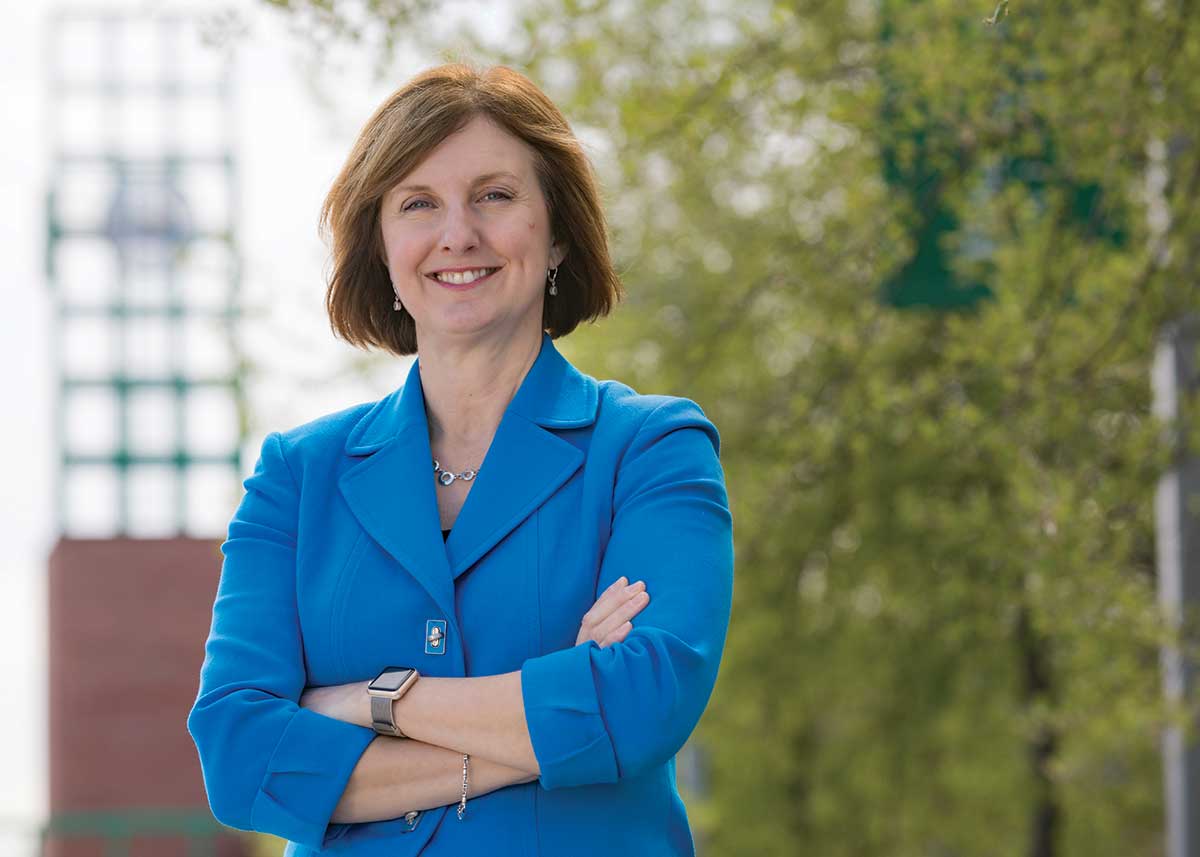A conversation with Elizabeth Chilton
New Harpur dean is scientist and singer

Before Elizabeth S. Chilton settled into her new job as dean of Harpur College of Arts and Sciences in mid-July, she sat down for a conversation with Binghamton University Magazine. While she is busy meeting 26 department chairs and more than 500 faculty members, here is a chance to meet her.
QUESTION: What led you to archaeology?
ELIZABETH CHILTON: I got into it completely by accident. I was a math major as a sophomore, and I was home one winter break and my father said, “How’s college going?” I said, “Oh, I’m kind of bored with math.” His advice was, “I think you should stick with it, but I think you should round out your education and take more liberal arts, something like anthropology as an elective.” I literally said, “What is anthropology?” And he sat up in his chair — having not received a college degree himself — and he said, “Anthropos — the study of man — how can you get a college education without taking an anthropology course?”
That spring, the only course that was open was Introduction to Primates, one of the least popular courses at the time. But I was captivated. The next semester I took three anthropology courses, and then I changed my major, but kept a minor in math.
It wasn’t until a summer field school in the Mohawk Valley at an Iroquoian archaeological site that I realized this was what I wanted to do for a career.
After graduation, I volunteered on a dig in Belize and it was a life-changing experience. I lived in a grass hut for five months with no electricity, no plumbing — complete with tarantulas and snakes. While of course it was exciting, I really missed the archaeology of the Northeast, where there are 13,000 years of human history that we walk over every day. I was fascinated by the disjuncture of a rich and diverse history and its invisibility in the present, both physical — meaning it’s a challenge to excavate because the New England Algonquians didn’t have permanent villages prior to European colonization — and in the curriculum and everyday conversation.
Q: How did you move into administration?
EC: Eleven years ago I was asked to become chair of the anthropology department. I saw it as a short-term duty but found that I really enjoyed it. In anthropology departments, archeologists often become department chairs in part because we manage large teams, large budgets, and resolve logistical problems and conflicts among diverse field and lab crews. I like facilitating the work of others; I’m a problem solver. Even as associate vice chancellor, I still publish and present, and have doctoral students to keep me grounded.
Q: As a child, what did you want to be when you grew up?
EC: In middle school, my English teacher had us write what we thought we’d be doing in 10 years. And I wrote that I was going to work half time as a telephone operator and the rest of the time I would be a mom to my three children and drive my husband to the train station because he was going to have a high-powered job in New York City.
It was a model I knew from home; my father worked for the telephone company in New York and commuted on the train every day, and my mom raised five children and ran the household.
My English teacher gave me an A, then wrote, “I think you can imagine more for yourself.” At the time, I went back and forth between being insulted and being confused, and then it dawned on me that I should imagine more for myself. I wrote to him after I got my PhD and thanked him.
Q: What’s on your to-do list before you leave UMass?
EC: I’m finishing up a project as an administrative co-leader to create a strategic plan for the establishment of a Center for Racial Justice and Urban Affairs, and hosting an international workshop on heritage in migration and displacement at UMass.
I’m also chairing the committee to hire my replacement as associate vice chancellor.
Q: What’s on your to-do list when you arrive at Binghamton?
EC: I’ve already begun my ethnographic study [she laughs]. I am looking forward to continuing to meet department chairs and faculty. It will take a while, but it’s really important to have face-to-face time.
I’m also excited to meet students. I don’t think I can manage it this fall, but something I’ve been thinking about is a “dean’s book club for undergraduates” — maybe a 12-person, one-credit class in which we read a book together and get to know each other.
Q: Do you have hobbies?
EC: Hiking and canoeing. We canoe in the Adirondacks every summer, and I’m interested in knowing about canoeing on the Susquehanna. But my passion is singing, mostly choral singing. At Amherst, I have a three-woman a cappella group and we sing Renaissance madrigals.
Q: Any parting words?
EC: One of the reasons Binghamton and I are a good fit is because of how much I value public research universities. Not only was Albany a good-quality education for me, but when I was doing those archeological excavations, I was working side by side with graduate students and faculty who were involved in the production of knowledge, not just the dissemination of knowledge.
I was at Harvard for five years and felt a bit like a fish out of water. I feel most comfortable and share values with public education. I’m a K– PhD, public school–educated person. And that’s where I want to give back.
